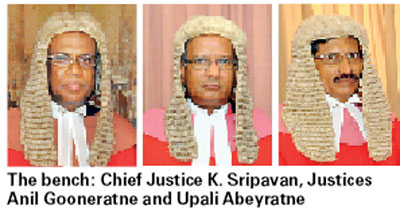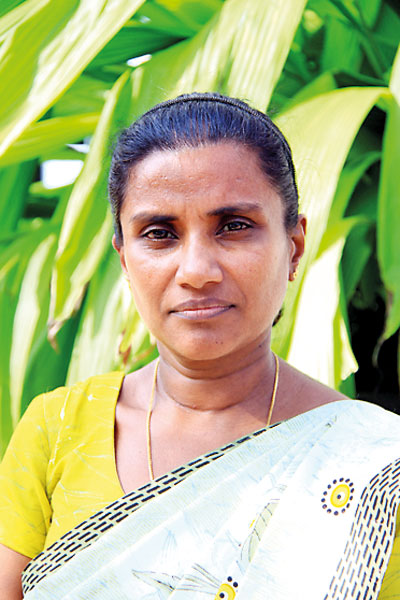Focus on Rights
Judicial upholding of the right not to be violated
View(s): Last week’s affirming by the Supreme Court of a female school teacher’s constitutionally protected right to talk to the media in the face of prolonged sexual harassment and intimidation at a leading educational establishment in Colombo calls for a multipronged deterrent approach to an all-pervasive problem in Sri Lanka.
Last week’s affirming by the Supreme Court of a female school teacher’s constitutionally protected right to talk to the media in the face of prolonged sexual harassment and intimidation at a leading educational establishment in Colombo calls for a multipronged deterrent approach to an all-pervasive problem in Sri Lanka.Emphasizing two broad principles of value
It is common knowledge that the complaint upon which the Court acted this time around is not rare. Indeed, this country ranks disgracefully high in South Asia when it comes to sexual harassment in the workplace. A mandatory code within the work place in general and the educational system in particular needs to be enforced with efficacious and independent inquiry mechanisms. The legal framework in this regard also needs to be revised. Clearly, penalising sexual harassment has not been a deterrent given the reluctance of many to undergo the traumatic ordeal of the criminal justice system.
Let us see exactly what the Court said. Two broad principles of equal importance were emphasized, namely the constitutional right to expression and information and the right to equality together with the constitutional regime of affirmative protections. Here, Manohari Pelaketiya, a female school teacher had petitioned the court alleging that a fellow teacher and the principal of Mahanama College had attempted to force unwanted sexual favours on her.
Upon refusal, she was subjected to constant harassment including the deprivation of increments. Unable to bear the strain and with no immediate relief forthcoming, she had aired her grievances on a television channel after which she was interdicted for infringing the Establishments Code which expressly prohibited such public utterances.
Deploring long and oppressive sexual harassment
Defending themselves, the authorities argued that her interview included allegations that the Ministry of Education had not taken measures to punish those responsible whereas, shortly before that interview, an internal inquiry had recommended that the offending school principal be compulsorily retired and the fellow teacher be interdicted.
It was also forcefully argued that if the Court was to rule in the petitioner’s favour, this would amount to a precedent that would make it impossible for government institutions to prevent public officers from disclosing information on internal disciplinary matters when such matters are being inquired into. However, the severity of the harassment to which the petitioner had been subjected to, clearly dominated the mind of the Court.
In the words of Justice Anil Gooneratne writing for the Court (with K. Sripavan CJ and Upali Abeyratne J. agreeing), the petitioner had ‘snapped’ under ‘the stress and strain occasioned by oppressive and burdensome conduct under colour of executive office,’ carried out for a long time. Indeed, the Court’s outrage in this regard is quite remarkable. Thus, it was opined that ‘it is not possible for a female to resist such abuses unless she is a strong personality who could react and retort to such abuses and harassment and make the abuser to shamelessly withdraw, being exposed to the public at large of his indecency.’
Echoing liberal jurisprudence of the nineties
Consequently, it was held that, even if she acted contrary to the Establishments Code, that would not deprive her of her constitutional protection. Quoting precedents of the Indian and US courts, the petitioner’s freedom of expression was ruled to ‘trump’ the Establishments Code.

Manohari Pelaketiya
There is firm domestic precedent supporting this view, though not explicitly quoted as such by the Court. Thus, in a norm-setting decision during the mid nineties, Justice MDH Fernando declared that the arbitrary stopping of the Non Formal Educational (NFEP) programme of the Sri Lanka Broadcasting Corporation (SLBC) that it ‘caused public unrest’ was unconstitutional. The Court asserted that “…. it is well to remember that the media asserts, and does not hesitate to exercise, the right to criticise public institutions and persons holding public office…such criticism must be deplored when it is without justification, (but) the right to make and publish legitimate criticism is too deeply ingrained to be denied.’
The September 2016 decision of the Court thus reflected its sweepingly liberal jurisprudence in the mid to late nineteen nineties before it became entangled in the ugly politicization of the Office of the Chief Justice.
Affirming the right to equality
Of equal importance is the second principle emerging from the Pelaketiya Case which emphasizes the right to equality of a female school teacher who became helpless ‘in the hands and control of indecent public servants within the school premises.’ As Justice Gooneratne observed, ‘sexual harassment or work place stress and strain occasioned by oppressive and burdensome conduct under colour of executive office,’ amounts to unconstitutional action infringing the right to equality. Here too, it was held that the right to equality as well as the regime of affirmative rights in the Constitution cannot be restricted or limited by the provisions of the Establishments Code
Undoubtedly this is a judicial salutation of the exemplary courage of a female school teacher in employing the media to stand up to the male establishment and against conduct that, (in the words of the Court), ‘would be unacceptable to any decent society.’ This stands as a categorical assertion of the fact that if internal procedures are futile, then public complaints are justified.
In this instance, the offender was an educational institution. Yet a warning is implicit therein for other organizations, including those of the private sector and the non-governmental sector. Taking disciplinary action against an individual on the basis that ‘internal institutional grievances’ are ventilated to the media where there is no other option available, will now be frowned upon. Even though such action may not be constitutionally challenged given that the constitutional remedy is limited to executive or administrative action, the unequivocal judicial stance reflected in the Pelaketiya Case remains of general legal importance.
Enforcing compliance to a policy of deterrence
In a wider sense, Sri Lanka may do well to look across the Palk Strait where the celebrated ‘Vishaka’ case (1997) did not merely result in token legislation but gave rise to country-wide awareness and anger against sexual harassment in the Indian workplace, forcing policy makers into reluctant compliance.
If Sri Lankan authorities fail to give serious attention to this issue, others who have been similarly violated should publicly discuss what they have faced. This would be a welcome ‘opening of the floodgates’ as it were.
In sum, the Pelaketiya Case must not be allowed to rest as one lonely judicial view. Given its singular value, it must attract a critical mass to propel compliance to reformed policy and legal standards, ensuring the right of both Sri Lankan men and women not to be violated in the workplace and to publicly protest thereto if needed. This is crucial.


Leave a Reply
Post Comment